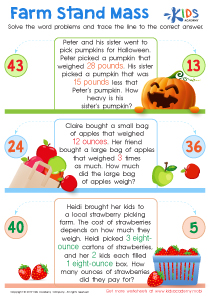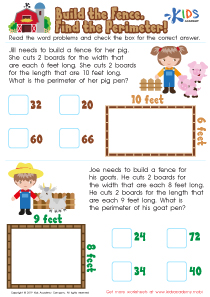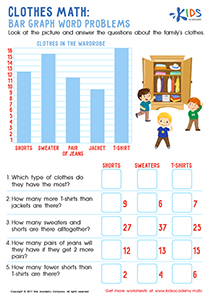Logical Reasoning Normal Addition and Subtraction Word Problems Worksheets for Ages 3-7
4 filtered results
-
From - To
Welcome to our engaging "Logical Reasoning Normal Addition and Subtraction Word Problems Worksheets" designed for children aged 3-7! These thoughtfully created worksheets help young learners develop critical thinking and problem-solving skills through exciting word problems. Each worksheet encourages kids to apply basic addition and subtraction concepts within relatable contexts, fostering a love for math while honing their logical reasoning abilities. Ideal for both classroom use and at-home learning, these worksheets combine fun and educational elements, ensuring that your little ones build confidence and competence in math. Explore our collection today to make learning enjoyable and effective!


Enrichment -2 Step Word Problems Worksheet


Solve the Problem: Trick–or–treating Worksheet


Word Problems: Assessment 2 Worksheet


Addition and Subtraction: Word Problems Worksheet
Parents and teachers should emphasize Logical Reasoning and Normal Addition and Subtraction Word Problems for children aged 3-7 for several reasons. First, these skills lay a foundation for critical thinking, which is essential as children progress in their education. Through engaging with word problems, kids learn to analyze situations, identify relevant information, and develop problem-solving strategies. This fosters cognitive development and prepares them for more complex concepts in math and science.
Next, these activities enhance literacy' skills, as children must comprehend language, decipher meaning, and communicate their thoughts. This integration of math and language promotes a holistic educational approach, helping children articulate their reasoning effectively.
Additionally, engaging with word problems cultivates perseverance and resilience as children learn to tackle challenges and understand that making mistakes is part of the learning process. It also encourages collaboration between teachers and parents, as they work together to guide children through these problems, reinforcing a supportive learning environment.
Moreover, early exposure to logical reasoning equips children with skills they can apply beyond the classroom, encouraging logical thinking in everyday situations. In summary, nurturing these skills at a young age sets a trajectory for lifelong learning, enhancing academic performance and overall intellectual growth.
 Assign to My Students
Assign to My Students














